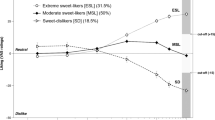Abstract
OBJECTIVE: The aim of this work was to assess the specific food type (high carbohydrate, high fat, high protein) preference profiles of individuals with Prader-Willi syndrome (PWS), obese controls and normal weight individuals. DESIGN: Subjects tasted a food predominantly high in carbohydrate, a food predominantly high in protein and a food predominantly high in fat over repeated trials and indicated their most preferred, second preferred and least preferred foods. Specific items tested on a given trial were counterbalanced in a block randomized fashion. SUBJECTS: These were 12 individuals with Prader-Willi syndrome, 12 matched obese controls (obese, but otherwise normal) and 14 normal weight subjects. MEASUREMENTS: The basic data were expressed as a proportion of each food type selected as most preferred over the total 27 trials. RESULTS: PWS subjects preferred high carbohydrate foods over high protein foods and high protein foods over high fat foods. These subjects demonstrated a statistically reliable difference in preference for high carbohydrate foods over high fat foods. However, normal weight and obese control subjects demonstrated no difference in food preferences. The only significant between-group comparisons were between PWS subjects and obese controls, with the PWS group showing a significantly greater preference for high carbohydrate foods than obese controls. CONCLUSIONS: The obesity of PWS was shown to have a significant and distinctly different food preference profile from normal weight and obese controls. The differences in food preference between the obese PWS and non-PWS subjects is in accord with the growing recognition of functional subgroups within the obese population, that may have not only differing underlying etiologies, but also distinct behavioral profiles of ingestion.
This is a preview of subscription content, access via your institution
Access options
Subscribe to this journal
Receive 12 print issues and online access
$259.00 per year
only $21.58 per issue
Buy this article
- Purchase on Springer Link
- Instant access to full article PDF
Prices may be subject to local taxes which are calculated during checkout
Similar content being viewed by others
Author information
Authors and Affiliations
Rights and permissions
About this article
Cite this article
Fieldstone, A., Zipf, W., Schwartz, H. et al. Food preferences in Prader-Willi syndrome, normal weight and obese controls. Int J Obes 21, 1046–1052 (1997). https://doi.org/10.1038/sj.ijo.0800514
Received:
Revised:
Accepted:
Issue Date:
DOI: https://doi.org/10.1038/sj.ijo.0800514
Keywords
This article is cited by
-
Food-related Neural Circuitry in Prader-Willi Syndrome: Response to High- Versus Low-calorie Foods
Journal of Autism and Developmental Disorders (2008)
-
Tirannieke mechanismen in het brein: Prader-Willi-syndroom en Angelman-syndroom
Nederlands tijdschrift voor de psychologie en haar grensgebieden (2006)



